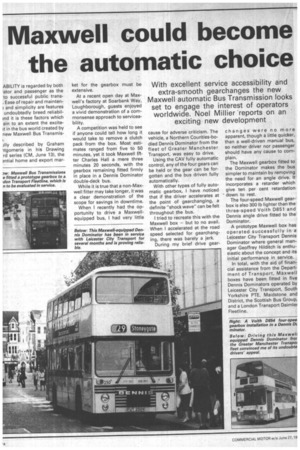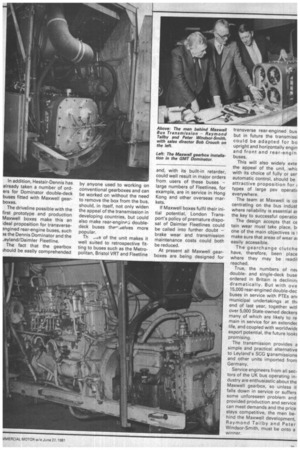Maxwell could become the automatic choice
Page 76

Page 77

If you've noticed an error in this article please click here to report it so we can fix it.
With excellent service accessibility and extra-smooth gearchanges the new Maxwell automatic Bus Transmission looks set to engage the interest of operators worldwide. Noel Millier •reports on an exciting new development
ABILITY is regarded by both .ator and passenger as the to successful public trans. Ease of repair and mainten) and simplicity are features undoubtedly breed reliabilInd it is these factors which am n to an extent the exciteit in the bus world created by new Maxwell Bus Transmis
Ally described by Graham itgomerie in his Drawing rd series (CM, June 13), the .ntial home and export mar ket for the gearbox must be extensive.
At a recent open day at Maxwell's factory at Soarbank Way, Loughborough, guests enjoyed a vivid demonstration of a cornmonsense approach to serviceability.
A competition was held to see if anyone could tell how long it would take to remove a clutch pack from the box. Most estimates ranged from five to 50 minutes, yet it took Maxwell fitter Charles Hall a mere three minutes 20 seconds, with the gearbox remaining fitted firmly in place in a Dennis Dominator double-deck bus.
While it is true that a non-Maxwell fitter may take longer, it was a clear demonstration of the scope for savings in downtime.
When I recently had the opportunity to drive a Maxwellequipped bus, I had very little cause for adverse criticism. The vehicle, a Northern Counties-bodied Dennis Dominator from the fleet of Greater Manchester Transport, was easy to drive.
Using the CAV fully automatic control, any of the four gears can be held or the gear can be forgotten and the bus driven fully automatically.
With other types of fully automatic gearbox, I have noticed that if the driver accelerates at the point of gearchanging, a definite "shock wave" can be felt throughout the bus.
I tried to recreate this with the Maxwell box — but to no avail. When I accelerated at the road speed selected for gearchanging, there was barely a jerk.
During my brief drive gear
changes were no more apparent, though a little quicker, than a well-driven manual bus, so neither driver nor passenger should have any cause to complain.
The Maxwell gearbox fitted to the Dominator makes the bus simpler to maintain by removing the need for an angle drive. It incorporates a retarder which give ten per cent retardation down to rest.
The four-speed Maxwell gearbox is also 300 lb lighter than the three-speed Voith D851 and Dennis angle drive fitted to the Dominator.
A prototype Maxwell box has operated successfully in a Leicester City Transport Dennis Dominator where general manager Geoffrey Hilditch is enthusiastic about the concept and its initial performance in service.
In total, with the aid of financial assistance from the Department of Transport, Maxwell boxes have been fitted in five Dennis Dominators operated by Leicester City Transport, South Yorkshire PTE, Maidstone and District, the Scottish Bus Group, and a London Transport Daimler Fleetline. In addition, Hestair-Dennis has already taken a number of orders for Dominator double-deck buses fitted with Maxwell gearboxes.
The driveline possible with the first prototype and production Maxwell boxes make this an :deal proposition for transverseangined rear-engine buses, such 3S the Dennis Dominator and the _eyland/Daimler Fleetline.
The fact that the gearbox ;hould be easily comprehended
by anyone used to working on conventional gearboxes and can be worked on without the need to remove the box from the bus, should, in itself, not only widen the appeal of the transmission in developing countries, but could also make rear-enginPai doubledeck buses ther-,selves more popular.
Th of the unit makes it well suited to retrospective fitting to buses such as the Metropolitan, Bristol VAT and Fleetline and, with its built-in retarder, could well result in major orders from users of these buses large numbers of Fleetlines, for example, are in service in Hong Kong and other overseas markets.
If Maxwell boxes fulfil their initial potential, London Transport's policy of premature disposal of Daimler Fleetlines could be called into further doubt — brake wear and transmission maintenance costs could both be reduced.
At present all Maxwell gearboxes are being designed for transverse rear-engined bus but in future the transmissi could be adapted for bo upright and horizontally engin and front and rear-engin buses.
This will also widely exte the appeal of the unit, whic with its choice of fully or ser automatic control, should be . attractive proposition for types of large psv operatic everywhere.
The team at Maxwell is co centrating on the bus indust where reliability is essential ar the key to successful operatio The design accepts that cc tam n wear must take place, bi one of the main objectives is make sure that areas of wear al easily accessible.
The gearchange clutche have, therefore, been place where they may be readil reached.
True, the numbers of nel, doubleand single-deck buse ordered in Britain is declining dramatically. But with ove 15,000 rear-engined double-dee buses in service with PTEs an municipal undertakings at thc end of last year, together will over 5,000 State-owned deckers many of which are likely to re main in service for an extender life, and coupled with worldwide export potential, the future look. promising.
The transmission provides a simple and practical alternative to Leyland's SCG Vansmissions and other units imported from Germany.
Service engineers from all sectors of the UK bus operating industry are enthusiastic about the Maxwell gearbox, so unless ii falls down in service or suffers some unforeseen problem and provided production and service can meet demands and the price stays competitive, the men behind the Maxwell development, Raymond Tailby and Peter Windsor-Smith, must be onto a winner.




















































































































